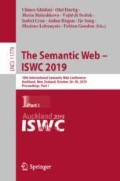Abstract
Event series, such as the Wimbledon Championships and the US presidential elections, represent important happenings in key societal areas including sports, culture and politics. However, semantic reference sources, such as Wikidata, DBpedia and EventKG knowledge graphs, provide only an incomplete event series representation. In this paper we target the problem of event series completion in a knowledge graph. We address two tasks: (1) prediction of sub-event relations, and (2) inference of real-world events that happened as a part of event series and are missing in the knowledge graph. To address these problems, our proposed supervised HapPenIng approach leverages structural features of event series. HapPenIng does not require any external knowledge - the characteristics making it unique in the context of event inference. Our experimental evaluation demonstrates that HapPenIng outperforms the baselines by 44 and 52% points in terms of precision for the sub-event prediction and the inference tasks, correspondingly.
Access this chapter
Tax calculation will be finalised at checkout
Purchases are for personal use only
Notes
- 1.
- 2.
- 3.
- 4.
- 5.
For example, the event series “TED talk”, whose set of edition template labels (e.g. “Avi Reichental: What’s next in 3D printing” and “Amanda Palmer: The art of asking”) has a high Gini impurity, is not included in the set of event series.
- 6.
- 7.
Existing benchmark datasets do not contain a sufficient amount of sub-event relations. For example, FB15K [3] only contains 224 triples containing one of the Freebase predicates /time/event/includes_event, /time/event/included_in_event or /time/event/instance_of_recurring_event.
References
Ahmeti, A., Razniewski, S., Polleres, A.: Assessing the completeness of entities in knowledge bases. In: Blomqvist, E., Hose, K., Paulheim, H., Ławrynowicz, A., Ciravegna, F., Hartig, O. (eds.) ESWC 2017. LNCS, vol. 10577, pp. 7–11. Springer, Cham (2017)
Balaraman, V., Razniewski, S., Nutt, W.: Recoin: relative completeness in Wikidata. In: WWW Companion (2018)
Bordes, A., Usunier, N., Garcia-Duran, A., Weston, J., Yakhnenko, O.: Translating embeddings for modeling multi-relational data. In: NIPS, pp. 2787–2795 (2013)
Darari, F., et al.: COOL-WD: a completeness tool for Wikidata. In: ISWC (2017)
Ellefi, M.B., Bellahsene, Z., et al.: RDF dataset profiling - a survey of features, methods, vocabularies and applications. Semant. Web 9(5), 677–705 (2018)
Färber, M., Ell, B., Menne, C., Rettinger, A.: A comparative survey of DBpedia, Freebase, OpenCyc, Wikidata, and YAGO. Semant. Web J. 1, 1–5 (2015)
Gottschalk, S., Bernacchi, V., Rogers, R., Demidova, E.: Towards better understanding researcher strategies in cross-lingual event analytics. In: TPDL (2018)
Gottschalk, S., Demidova, E.: EventKG: a multilingual event-centric temporal knowledge graph. In: Gangemi, A., et al. (eds.) ESWC 2018. LNCS, vol. 10843, pp. 272–287. Springer, Cham (2018)
Gottschalk, S., Demidova, E.: EventKG+TL: creating cross-lingual timelines from an event-centric knowledge graph. In: ESWC Satellite Events (2018)
Gottschalk, S., Demidova, E.: EventKG - the hub of event knowledge on the web- and biographical timeline generation. Semant. Web (2019)
Kaltenbrunner, A., Laniado, D.: There is no deadline - time evolution of wikipedia discussions. In: WikiSym. ACM (2012)
Kuzey, E., Vreeken, J., Weikum, G.: A fresh look on knowledge bases: distilling named events from news. In: CIKM, pp. 1689–1698. ACM (2014)
Lajus, J., Suchanek, F.M.: Are all people married? Determining obligatory attributes in knowledge bases. In: WWW, pp. 1115–1124 (2018)
Lehmann, J., Isele, R., Jakob, M., et al.: DBpedia - a large-scale, multilingual knowledge base extracted from Wikipedia. Semant. Web 6(2), 167–195 (2015)
Mishra, A., Berberich, K.: Leveraging semantic annotations to link Wikipedia and news archives. In: Ferro, N., et al. (eds.) ECIR 2016. LNCS, vol. 9626, pp. 30–42. Springer, Cham (2016)
Myers, E.W.: An O(ND) difference algorithm and its variations. Algorithmica 1(1–4), 251–266 (1986)
Nentwig, M., Hartung, M., Ngomo, A.N., Rahm, E.: A survey of current link discovery frameworks. Semant. Web 8(3), 419–436 (2017)
Nguyen, D.Q., Sirts, K., Qu, L., Johnson, M.: STransE: a novel embedding model of entities and relationships in knowledge bases. In: NAACL HLT (2016)
Paulheim, H.: Knowledge graph refinement: a survey of approaches and evaluation methods. Semant. Web 8(3), 489–508 (2017)
Paulheim, H., Bizer, C.: Type inference on noisy RDF data. In: ISWC (2013)
Raileanu, L.E., Stoffel, K.: Theoretical comparison between the gini index and information gain criteria. Ann. Math. Artif. Intell. 41(1), 77–93 (2004)
Razniewski, S., et al.: But what do we actually know? In: AKBC (2016)
Setty, V., Anand, A., Mishra, A., Anand, A.: Modeling event importance for ranking daily news events. In: WSDM. ACM (2017)
Shi, B., Weninger, T.: ProjE: embedding projection for knowledge graph completion. In: AAAI 2017, pp. 1236–1242 (2017)
Swan, R., Allan, J.: Automatic generation of overview timelines. In: SIGIR (2000)
Tanon Pellissier, T., et al.: From freebase to Wikidata: the great migration. In: WWW (2016)
Pellissier Tanon, T., Stepanova, D., Razniewski, S., Mirza, P., Weikum, G.: Completeness-aware rule learning from knowledge graphs. In: d’Amato, C., et al. (eds.) ISWC 2017. LNCS, vol. 10587, pp. 507–525. Springer, Cham (2017)
Tempelmeier, N., Demidova, E., Dietze, S.: Inferring missing categorical information in noisy and sparse web markup. In: The Web Conference (2018)
Vrandečić, D.: Wikidata: a new platform for collaborative data collection. In: WWW Companion. pp. 1063–1064. ACM (2012)
Wang, Q., Mao, Z., Wang, B., Guo, L.: Knowledge graph embedding: a survey of approaches and applications. IEEE TKDE 29(12), 2724–2743 (2017)
Yuan, Q., et al.: Open-schema event profiling for massive news corpora. In: CIKM (2018)
Acknowledgements
This work was partially funded by the EU Horizon 2020 under MSCA-ITN-2018 “Cleopatra” (812997), and the Federal Ministry of Education and Research, Germany (BMBF) under “Simple-ML” (01IS18054).
Author information
Authors and Affiliations
Corresponding author
Editor information
Editors and Affiliations
Rights and permissions
Copyright information
© 2019 Springer Nature Switzerland AG
About this paper
Cite this paper
Gottschalk, S., Demidova, E. (2019). HapPenIng: Happen, Predict, Infer—Event Series Completion in a Knowledge Graph. In: Ghidini, C., et al. The Semantic Web – ISWC 2019. ISWC 2019. Lecture Notes in Computer Science(), vol 11778. Springer, Cham. https://doi.org/10.1007/978-3-030-30793-6_12
Download citation
DOI: https://doi.org/10.1007/978-3-030-30793-6_12
Published:
Publisher Name: Springer, Cham
Print ISBN: 978-3-030-30792-9
Online ISBN: 978-3-030-30793-6
eBook Packages: Computer ScienceComputer Science (R0)


